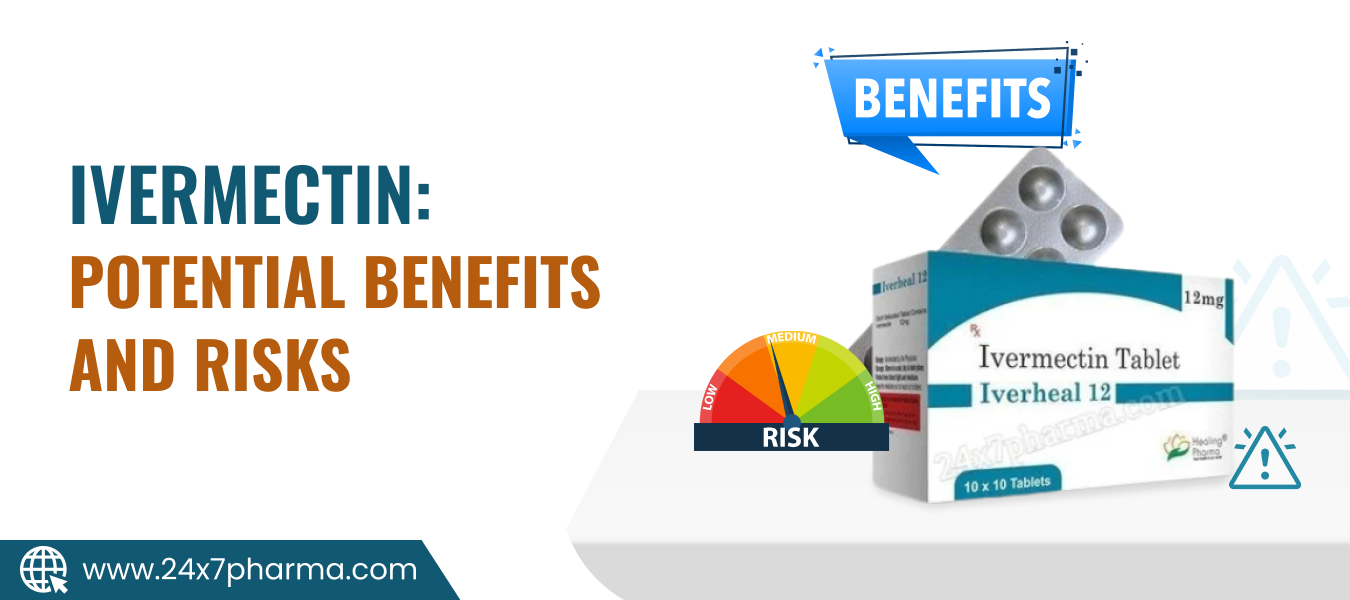Ivermectin, a drug initially developed to treat parasitic infections in animals, has gained widespread attention in recent years, especially for its potential use in humans. With the ongoing health discussions surrounding its efficacy in treating various conditions, it’s important to understand both the benefits and risks of this drug.
What is Ivermectin?
It is an anti-parasitic medication primarily used to treat a variety of parasitic diseases in humans and animals. Its use in veterinary medicine is well-established, particularly for treating parasitic infestations like heartworm and mites in animals. However, its use in humans has expanded significantly over the past few decades. It is commonly prescribed to treat conditions such as river blindness (onchocerciasis), strongyloidiasis (a type of roundworm infection), and scabies.
In addition to its traditional uses, ivermectin has also garnered attention as a potential treatment for conditions such as COVID-19. Although studies are still ongoing, it has sparked debates about its effectiveness in fighting viral infections.
Ivermectin Uses for Humans
Ivermectin’s primary use in humans is for parasitic infections. The World Health Organization (WHO) lists it as an essential medicine, highlighting its importance in treating various diseases, especially in areas with limited access to healthcare. Below are some common human uses of ivermectin:
- River Blindness (Onchocerciasis): This is a parasitic infection transmitted by black flies. Ivermectin is highly effective in reducing the number of parasites, thereby preventing blindness and other serious complications.
- Strongyloidiasis: Caused by the Strongyloides parasite, this infection can be life-threatening, especially for immunocompromised individuals. Ivermectin effectively clears the parasite from the body.
- Scabies: Scabies is caused by a mite infestation in the skin. Ivermectin is used in oral form when topical treatments fail, providing relief from intense itching and skin irritation.
- Lice: Ivermectin can also be used to treat head lice, particularly in cases where traditional treatments have not worked.
In recent years, It has been studied for its potential to treat other diseases, including some viral infections. However, its use outside of approved indications, especially for COVID-19, remains controversial and not widely recommended by health authorities.
Ivermectin Side Effects
Like any medication, ivermectin comes with a potential for side effects. While most individuals tolerate the drug well, it’s important to be aware of both common and serious adverse reactions. Below are some of the possible side effects of ivermectin:
Common Side Effects:
- Nausea or vomiting
- Diarrhea
- Dizziness or lightheadedness
- Fatigue
- Abdominal pain or discomfort
Serious Side Effects:
- Severe skin reactions (e.g., rashes, swelling)
- Eye irritation or inflammation
- Changes in vision
- Seizures (although rare)
- Confusion or difficulty concentrating
If any of these serious side effects occur, it’s crucial to seek medical attention immediately. Additionally, ivermectin should not be used in individuals with certain medical conditions, such as liver disease, without careful medical supervision.
Ivermectin Dosage: How Much is Safe?
The dosage of ivermectin can vary depending on the condition being treated, the patient’s weight, and the severity of the infection. For most human uses, ivermectin is taken as a single dose, though additional doses may be required depending on the specific treatment plan prescribed by a healthcare professional.
- For Onchocerciasis: Typically, a single dose of ivermectin is given, with a repeat dose recommended after several months or based on monitoring by a healthcare provider.
- For Strongyloidiasis: A typical regimen includes multiple doses over a couple of days.
- For Scabies and Lice: A single dose is often effective, but in certain cases, a repeat dose might be needed after a week or so.
It’s essential that ivermectin be taken as directed by a healthcare provider to ensure both safety and effectiveness. Dosage adjustments may be required for individuals with liver or kidney issues.
How to Get Ivermectin: Is it Available Over-the-Counter?
It is a prescription medication in many countries, including the United States, meaning it cannot be obtained without a prescription from a licensed healthcare provider. However, in some cases, you may find it available through online pharmacies or as part of veterinary treatments, but it’s crucial to be cautious when purchasing the drug online, especially from unverified sources.
Ivermectin for Sale: Purchasing Safely
If you’re considering buying ivermectin, it’s important to do so through reputable channels. Ivermectin for sale can be found at licensed pharmacies, where a healthcare professional can provide guidance on whether the drug is suitable for your condition. While it may be tempting to seek cheaper alternatives or buy ivermectin tablets from online sellers, beware of counterfeit products or improper dosages, which can be dangerous.
Risks of Self-Medicating with Ivermectin
Taking ivermectin without proper medical supervision can pose serious risks. While the drug is generally considered safe when used appropriately, misuse or taking too much can result in severe side effects. Furthermore, taking ivermectin for conditions it hasn’t been approved to treat—such as viral infections like COVID-19—can be ineffective and potentially harmful.
In summary, It is an effective treatment for several parasitic infections and has a long-standing track record in both human and veterinary medicine. However, it’s important to only use the medication under the guidance of a healthcare provider to ensure it is appropriate for your specific health needs and to avoid any potentially harmful side effects.
If you’re interested in Medication, speak with your doctor to determine if it’s the right option for your condition. Safe and responsible use of medications is crucial to ensuring the best possible outcomes for your health.

